Jack of All Trades
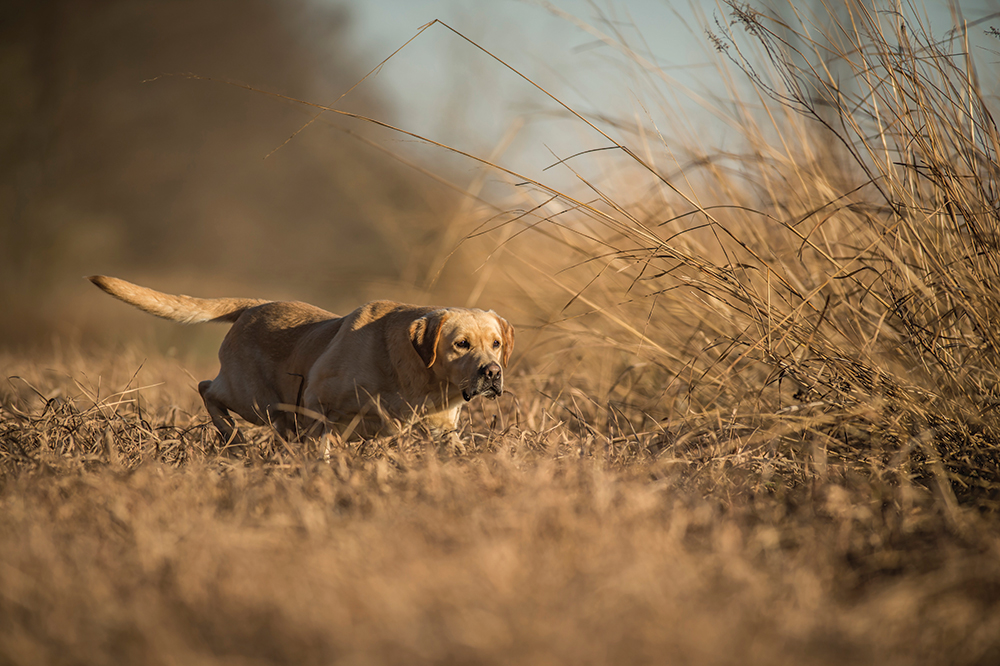
I steadied my lens on the handsome, well-built black Lab as he confidently took the recently dispatched rooster from his trainer with an impressive air of self-assurance. With a perfect hold and a textbook, off-camera gaze, Scotch was poised for his modeling debut. It was evident after only a few frames that he was something special—the product of superior bloodlines, extensive training, and incredible instincts. Little did I know that this impromptu portrait session would lead to many opportunities and a deep appreciation and respect for the pointing Labrador retrievers of Hunters Point Kennel (HPK).
Cousins Justin McGill and Nate Hamblin, co-owners of HPK, followed a serendipitous path to becoming breeders and trainers of pointing Labs. They grew up with a love of all things outdoors—particularly upland bird and waterfowl hunting—which took shape as they hunted the woods and waters of the Hawkeye State. And, like those of most red-blooded, rural American farm boys, their story begins with a good dog.
When McGill graduated college with a degree in agricultural systems, he had a very specific, three-part objective—a plan that included the essentials of nearly every country music chart-topper. “I wanted to buy a dog, a gun, and a pickup truck,” he said with a warm, pensive smile. He began with the dog, and his search didn’t take long. He bought a pointing Lab from Hunters Point Kennel in Salem, Indiana—the same breeder from whom their grandfather had bought a dog named Hunter for Hamblin 17 years earlier. McGill remembers being so impressed with Hunter’s disposition, drive, and intelligence that he wanted such a dog for himself.
The duo shared many great days afield with Hunter, and with fond memories they recollect on those hunts, attributing their love of the pointing Lab breed to Hunter’s ability to perform, no matter what or where they hunted.
McGill’s first dog from HPK quickly turned into five, followed by an opportunity to buy two more. As luck would have it, the owners of HPK were looking to retire, and they saw McGill as the perfect heir apparent to their business.
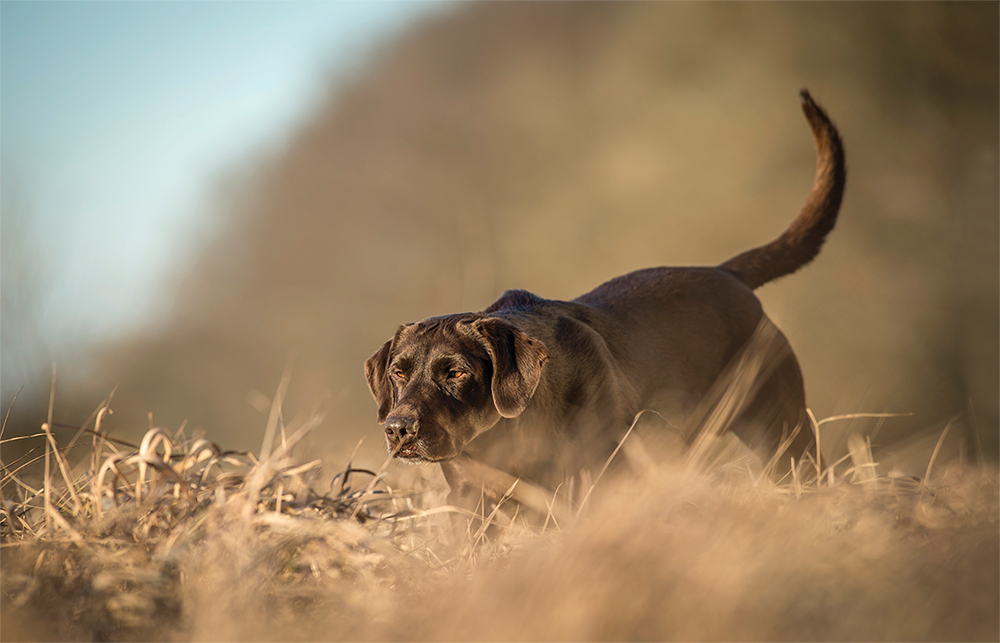
“Looking back on how things played out, getting those first few dogs from HPK was essentially a job interview,” says McGill. “I really came to respect the original owners of HPK, their business model, and their approach to breeding and training pointing Labs. I learned a lot about the breed’s versatility and popularity, and I was immediately hooked.” McGill and his wife purchased HPK and added Hamblin to the roster as lead trainer shortly after.
Today, HPK is based in Marshalltown, Iowa. With ample sweat equity and persistence, the duo eventually found an avenue to turn their passion into profit. While McGill and Hamblin both wear multiple hats, and juggle various responsibilities, McGill focuses his efforts on business strategy and development, while Hamblin handles most of the training and customer service.
McGill’s management background equips him quite well for running the business side of things. His upbringing on a dairy farm honed his expertise in animal genetics, pedigree and veterinary science. When he’s not at the business helm of HPK, McGill teaches college classes in industrial technology and applied engineering. He’s driven, pragmatic, and focused.
Hamblin’s professional background is in sales, and when you meet him, it’s instantly obvious that he’s a people person. He’s laid back, patient, and flashes a broad, consistent smile that never seems to fade. His calm demeanor, his fascination with canine behavior, and his love of working with young puppies in the field form a strong foundation for his self-taught training methods that began with Hunter, his boyhood hunting companion.
HPK operates a modern, well-appointed kennel that has served happy customers in all 50 states, as well as the Dominican Republic, Greece, the United Kingdom, South Korea, United Arab Emirates, Canada, and Mexico. With a diverse client list ranging from hardcore hunters to professional athletes, HPK prides itself on breeding healthy, versatile dogs for its discerning clientele. Several of their dogs work full-time for outfitters and guides, while others work as service dogs for veterans with post-traumatic stress disorder and other disabilities. Four of their dogs even live on Wall Street.
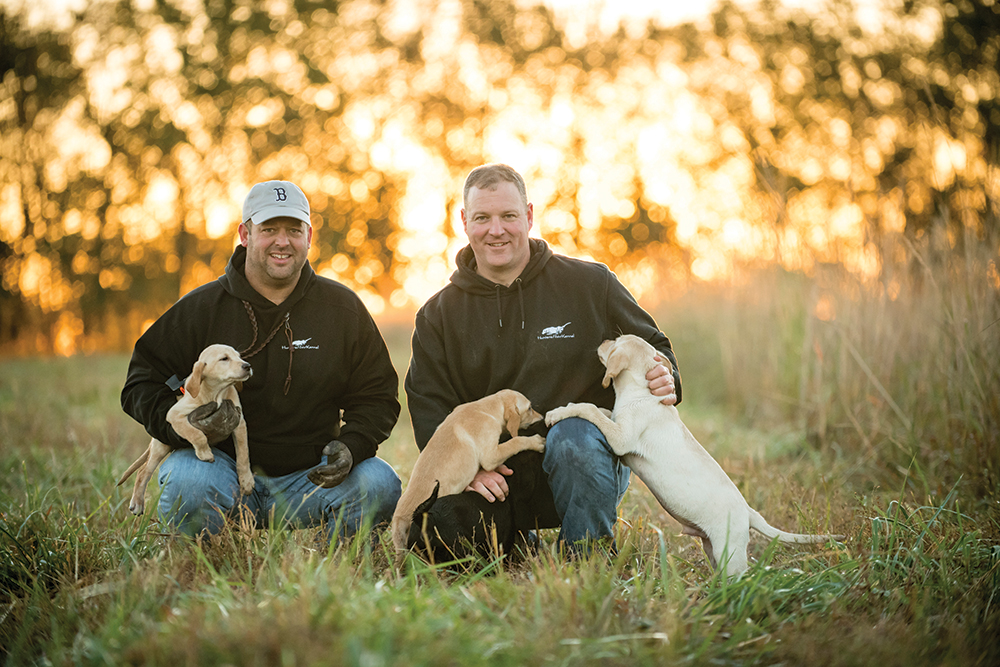
“When you buy a dog from us, you’re buying a combined 30 years of genetic refining and training experience,” says McGill. “Whether you buy a pup with no training, a started dog, or a fully trained pup, you can rest assured that we’re with you every step of the way to make your experience positive and rewarding.”
McGill and Hamblin work hard to preserve the integrity and versatility of the breed—which has positioned HPK as a well-respected and recognized name in the pointing Lab community. McGill and Hamblin have served for several years on the board of the American Pointing Labrador Association, and they’re regularly asked to judge hunt tests.
McGill explains that there has always been a subset of Labradors that carried and held the pointing trait, but for years, breeders selected against it. It wasn’t until the mid-1980s that breeders began to select the pointing trait when breeding their Labs, and thus the pointing Lab was further developed.
So what, exactly, drew them to the breed? For McGill and Hamblin, it’s a no-brainer. It all comes down to versatility. “This breed really is the perfect jack of all trades,” McGill asserts. “It’s the ultimate dog for the guy who wants to do just about everything—and that’s very appealing.” Whether you hunt pheasant in the Dakotas, grouse in the Northern woods, chukar in the sage-covered hills of Utah, or waterfowl in the swamps of Louisiana, McGill says his dogs will deliver.
Hamblin and McGill both say that pointing Labs’ impeccable hunting abilities, coupled with their friendly demeanor, make them both the perfect hunting companions and the ideal family pets. “They do a little bit of everything. I have people who hunt grouse, woodcock, and chukar, all with our Labs. I also have people who only duck and goose hunt with them. They do a little bit of everything and unlike other dogs that can be very wound, they are also good family dogs and good companions. I know that is cliché, but it is true,” McGill asserts.
But just because dogs are bred to be versatile doesn’t mean that owners have adequate time to get the most out of their dogs—and that’s where HPK can help. Hamblin sees a lot of well-intentioned clients who simply don’t have the time to adequately train a new pup.
McGill says that HPK’s goal when training dogs is to first get them in the field and excited about hunting. “We try to get them hunting in front of us and get them excited about pointing, then we bring them back and do the retrieving work.” McGill continues, “It is easier to convince a Lab to go out and go hunting before you teach them that all the reward comes from being by your side.”
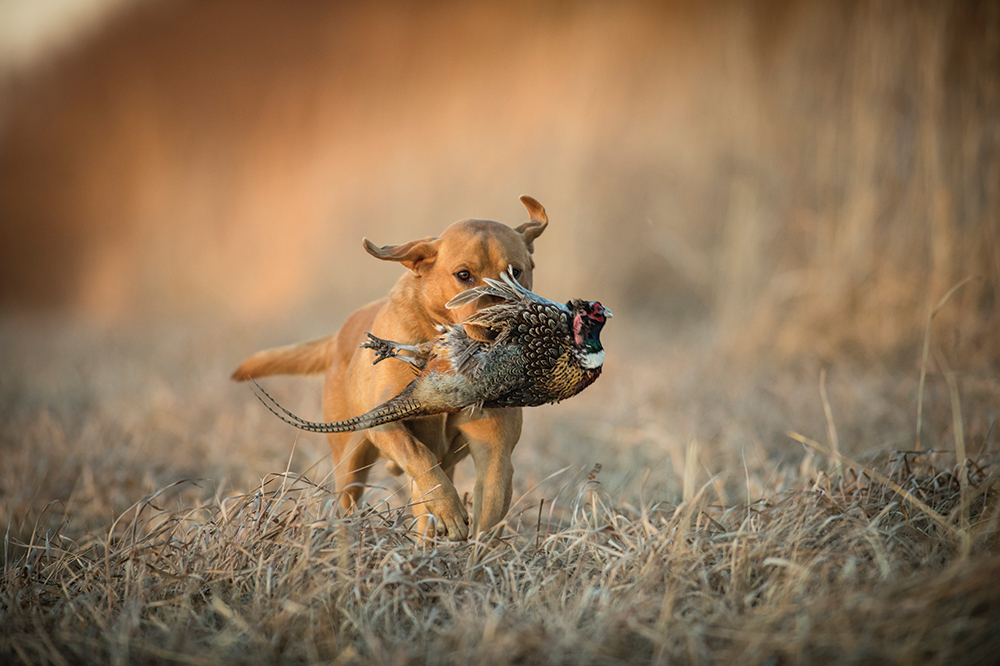
A challenge Hamblin sees with training such versatile dogs is the lack of time involved in training for both waterfowl and upland hunting. “These dogs are hardwired to be fully capable of excelling at either, but most people just don’t have enough time to fully train for both,” he asserts.
McGill explains that their strengths are also their weakness. Because pointing labs are great at hunting, retrieving, and pointing, they are not speciailized in any one skill. “If you’re exclusively running a quail plantation and need the best pointing dogs, pointing Labs may not be for you. To me that is their biggest drawback. They are good at everything, but not specialized in one ability,” McGill asserts.
Hamblin explains that when it comes to training strategies, no one specific strategy works for all dogs, and recognizing that fact is a strength in itself. “No two dogs should be trained the same. You should really read the dog—get inside it’s head—and understand what it’s thinking, and know how it reacts to commands in different ways. You’ll be a better trainer by tailoring your approach in very critical—sometimes very subtle—ways.”
Perhaps HPK’s most substantial added value for their customers is its sincere desire to match the right pup with the right buyer. McGill and Hamblin encourage all potential customers to do extensive research on the breed, and to visit their kennel to familiarize themselves with the dogs—to meet them face to face and ask lots of questions about training, expectations, and the health and genetics of their dogs. This gives McGill and Hamblin a clear idea of what training will be the most beneficial to both the dog and the owner.
When discussing getting a dog from HPK, prospective customers should not only choose their preferred gender, color, size, and shape, but also discuss their daily routine and hunting lifestyle—as well as their expectations in a dog—in order to ensure HPK matches the right pup with the right client.
“We work very hard to tailor the dog to the environment in which it’s going to live,” Hamblin says. “I think one of the strengths we have as a kennel—one of the things we pride ourselves on—is being able to look at a client’s list of needs, and essentially select genetics that will succeed in that environment.” With a wide array of genetic packages to choose from, customers certainly have plenty of good options.
Scotch’s first photo shoot with me made me a believer. A solid hour and more than a thousand photos after he first held that rooster, and the proof was in the pixels. HPK’s pointing Labs are well-bred, versatile companions that take to the woods or water with enviable energy and drive. And when the hunt is over, they’re equally excited to sit by your side and enjoy a belly rub and family time.
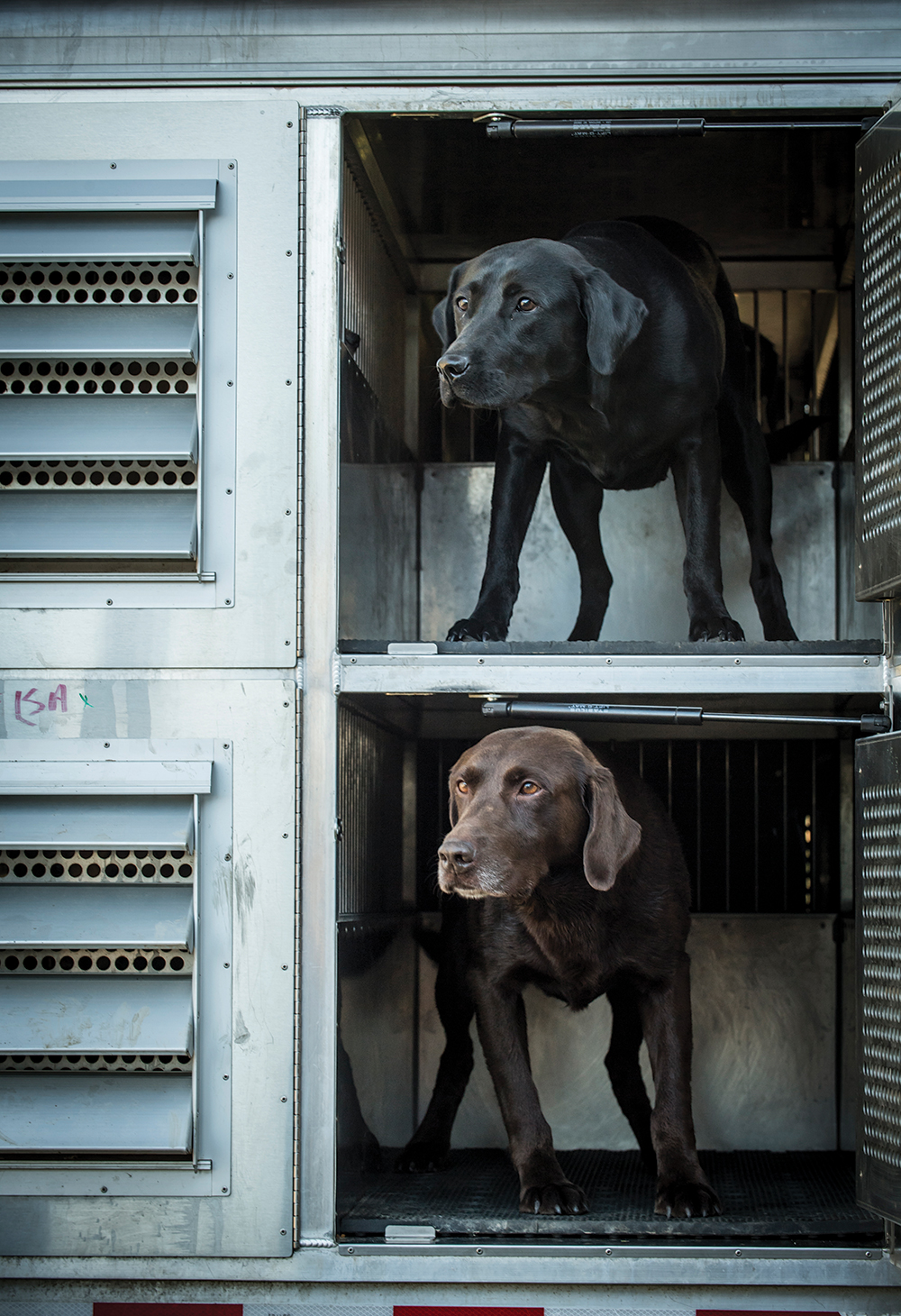
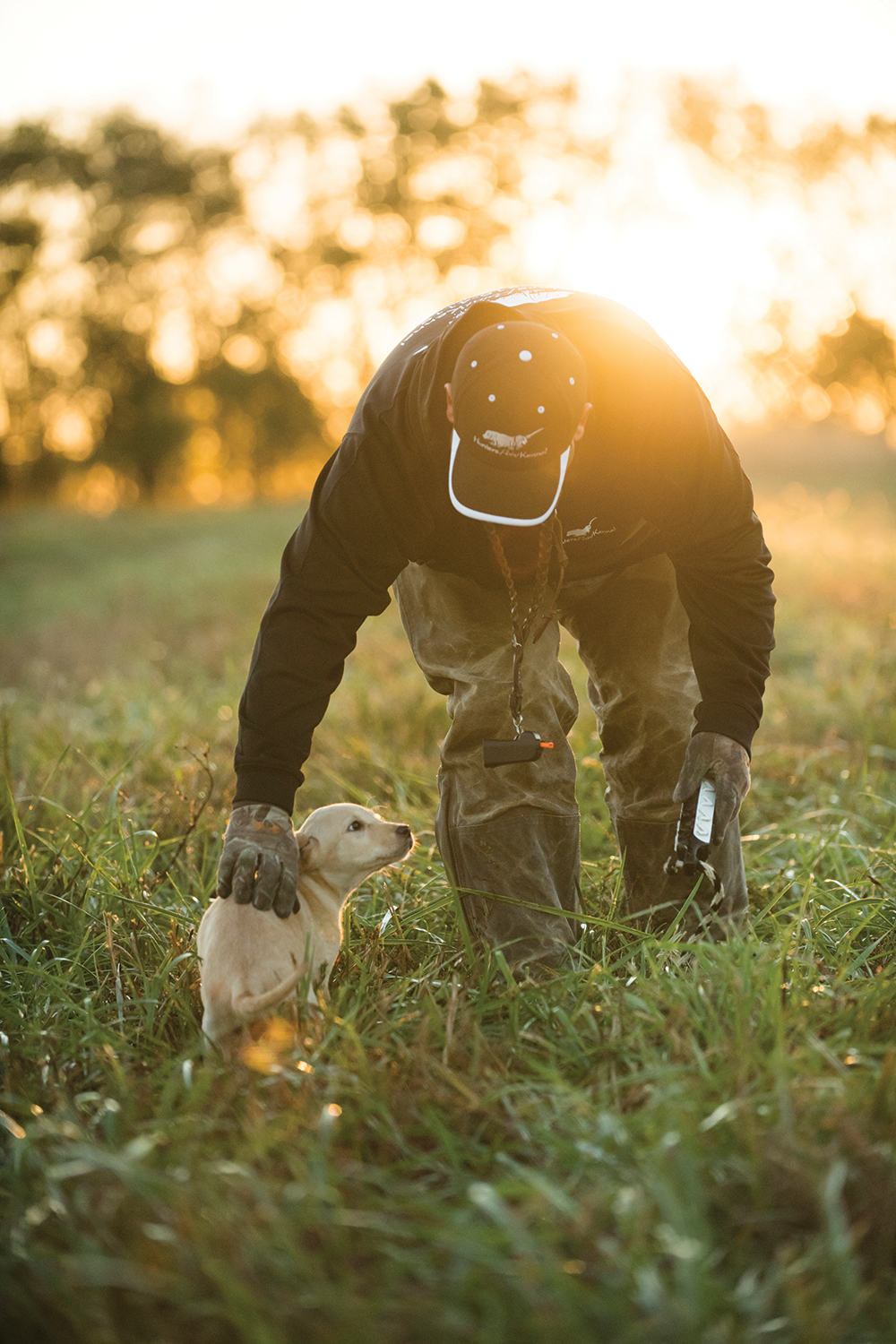
Originally published in Volume 6, Number 2 (Feb-Mar 2018) of Covey Rise.
























